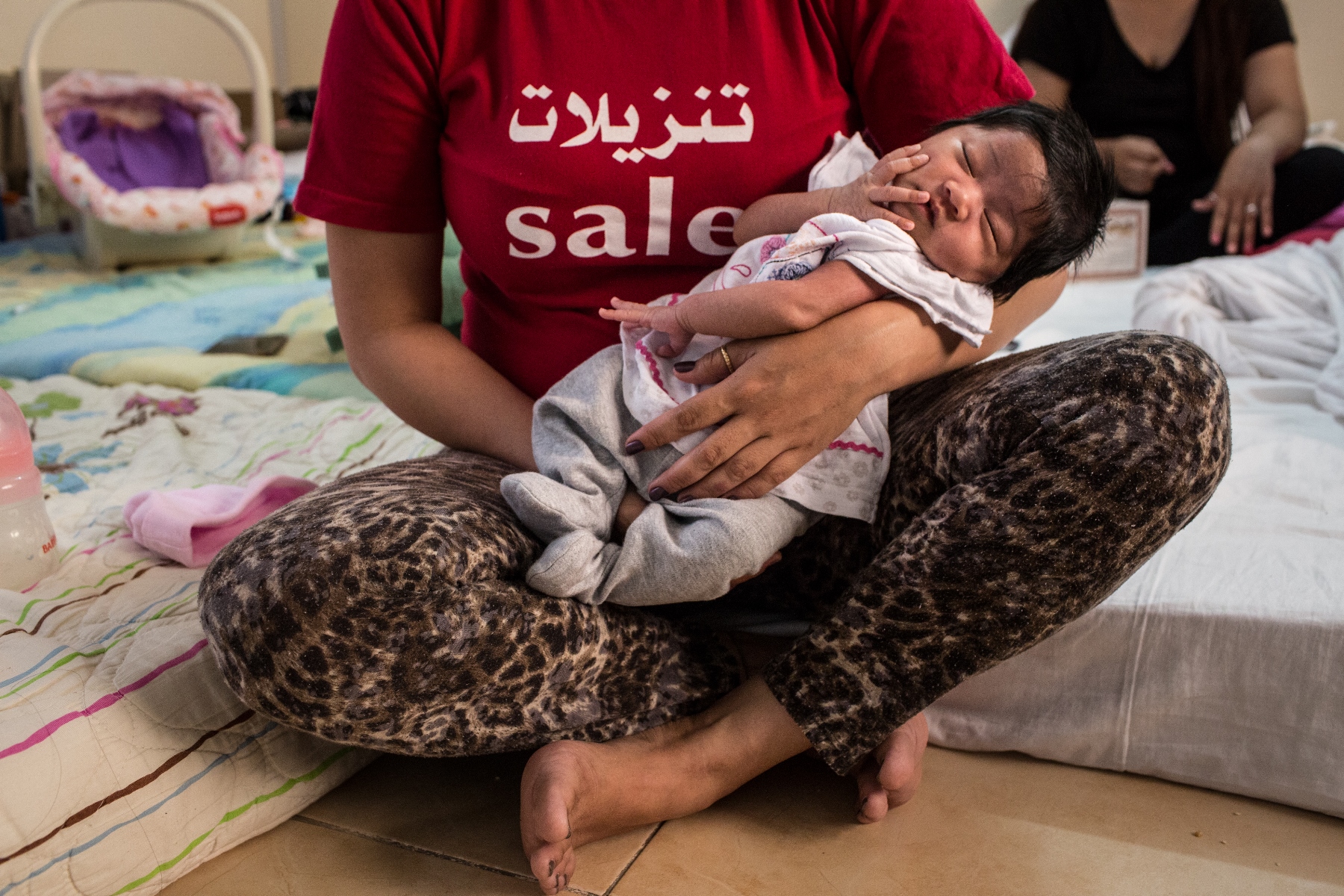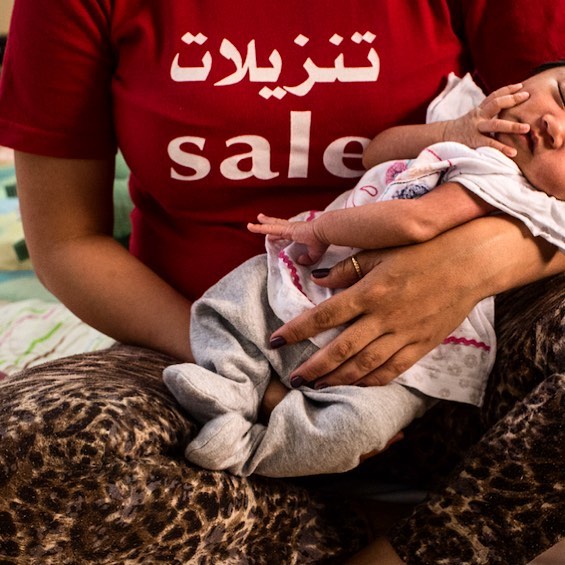
It was a hot Friday evening in Doha when I downloaded the MeetMe app and created a profile.
One of the men I had interviewed in a labor camp told me that this is where “his colleagues” met women.
On MeetMe, I pretended to be a 26-year-old Filipina who had just moved to Doha and was looking to make new friends.
Immediately, messages from men living in the city flooded my feed. Some were perfunctory greetings with a smiley emoji, but others were more direct.
A lot more direct.
Paying for sex
Instead of asking how I was doing, I was asked, “How much?”
I attempted to “flirt” with one man who was aggressive and persistent.
I coyly asked him what kind of women he liked, did he do this often, and did he always pay. I threw in a line about how I wanted to be the only one.

He said I was asking too many questions. “I only want sex. Not asking 4 marriage,” he replied.
Others were more subtle with their overtures, with one inviting me to join him for “dinner and music in his accommodation.”
His invitation came with a promise. For the pleasure of my company, he would “gift” me QR2,000 since it would be my first time visiting him.
‘Zina’ laws
It had been a while since I had been on a dating app, but I was taken aback by the blatant offers of money for sex.
Unmarried sex may be a crime in Qatar, but that certainly does not stop people from finding it, having it and paying for it, if needed.

Prostitution is illegal in Qatar and punishable through jail time.
The country also has “zina” laws – the Arabic term for laws that criminalize sex outside of marriage – punish pregnancy out of wedlock, unmarried sex and adultery with imprisonment of up to one year.
However, it has become difficult to monitor how often people in Qatar are tried under these laws because media reporting on the subject has dwindled.
This does not surprise one lawyer in Doha who I spoke to on condition of anonymity.
The lawyer said that he had noticed deliberate efforts within the court system not to call attention to Qatar’s human rights violations – including so-called “love cases” – since being awarded hosting rights to the 2022 World Cup.
In his experience, the courts want to sentence zina offenders and deport them as quickly as possible.
“Qatar does not want to be seen as the country that sends pregnant women to jail,” he told me.
Poor and vulnerable
But the truth is that Qatar does send pregnant women to jail.
Specifically, low-skilled migrant women.
Though they certainly don’t have the monopoly on unmarried sex, they are pretty much the only ones being jailed for it in Qatar because they are easiest to catch.
Many of these women are the target of the men using MeetMe and similar apps.
Often, they are both lonely and make a very low income. This is a dangerous combination when zina laws are applied.

These women are often persuaded to get a “boyfriend” to help supplement their salaries and provide comfort and friendship.
But if they discover they are pregnant as a result, these woman are often trapped.
While the more wealthy women can afford a trip abroad for an abortion, those on lower incomes cannot, and they can pay a heavy personal price.
Jail visits
In May, I visited two jails, one women’s shelter and one deportation center in Qatar.
Almost all of the women I spoke to who were jailed or being deported for “love cases” were low-skilled migrant women.
This includes Wazilfa, who I first met in Capital Security in Najma. She came out carrying her baby in her arms, wrapped in a blanket and the folds of her sari.

She eyed us with suspicion, but as soon as my translator explained that we were looking for pregnant women in jail who needed some kind of assistance, her story came tumbling out in a rush of broken Arabic.
Wazilfa, a divorced mother, had met a Bangladeshi man online and he became her boyfriend. They carried on a relationship for almost one year.
Many steamy Friday afternoons ensued, and she got pregnant.
“He told me he loved me,” she said. But he disappeared when she told him she was pregnant.
When Wazilfa began to show, her employer turned her over to the authorities.
She held up a hand and told us to wait while she found a piece of paper and a pen.
When she came back, she held up the paper to the glass wall the separated us. It had a phone number scribbled on it.
“Please call him. Tell him that I will marry him. Just please get me and my baby out of jail,” she begged.
There were many other women like Wazilfa.
Marriage the only way out
Jo, for example, had been dressed in an abaya and taken out of jail for a wedding ceremony that involved nothing more than signing papers.
She did not even speak or look at the man who was the father of her child.
“The trip to the Egyptian Embassy was longer than the wedding ceremony,” she said.
The father had denied paternity, but he could not deny the results of a court-mandated DNA test.
Jo had agreed to marry him to get out of jail.
Then there was Ann, who gave birth in the bathroom of her employer’s home. And a woman who asked to be called V, who was turned in by hospital staff for allegedly trying to have an abortion.
Most men avoid detention
There was a common thread among these women.
They were all domestic workers, they all met their boyfriends online and all of the men had abandoned them once they were told they were going to be fathers.
These men usually avoid detention.

Jo is unsure, but she thinks her husband was able to avoid jail by marrying her. She no longer speaks to him.
Ann’s boyfriend, meanwhile, had apparently given her a fake name. With the help of her sponsor, she was able to avoid jail. The police traced his real identity through his phone number.
He was in jail for a few days and avoided longer detention time when he married her.
Birth control options
While it seems that sex is easy enough to find in Doha, birth control and other interventions are not, if you are a female domestic worker.
Birth control pills are obtainable over the counter at pharmacies in Qatar, but these are both relatively expensive and hard to hide from a sponsor.

Domestic workers would also need permission from their employer to go shopping in a mall alone to buy them – which not all are granted.
Additionally, many of the women I spoke to generally knew little about contraception.
Those who did know about contraceptive pills, for example, did not know where to get them from or which ones to ask for.
Condoms, meanwhile, are bought easily from local stores, but women were iffy about using them and were also worried about these being found by their employers.
As a labor rights advocate I spoke to wryly said, “I’d be amused to find even the most liberal of madames not alarmed by the sight of condoms in her nanny’s drawer.”
Illegal abortions
Because prevention is difficult, many women must instead focus on trying to terminate unwanted pregnancies.
Abortions are illegal in Qatar, but this doesn’t stop people from seeking them out.
On my behalf, my interpreter asked her obstetrician where she would direct a woman who had encountered “a delicate situation” like this.
“Lebanon, for a short ‘holiday,’ ” replied her doctor.
This option is however out of reach for most domestic workers for reasons of cost, and also because they would need to obtain an exit permit from their sponsor.

However, pills that induce medical abortion are sold online specifically to residents of the Gulf.
For $240 paid through Western Union, companies promise to deliver the pills directly to you. The seller promises to walk you through the procedure.
However, that’s more than half the average monthly salary of a domestic worker. Additionally, there is no medical guarantee that the pills are safe to use.
‘Invisible women’
It’s clear that low-paid domestic workers are the real victims of zina laws.
However, calls for their repeal have always been ignored by the Qatari government.
That’s not entirely surprising considering that until recently, domestic workers were not even protected in the Labor Law.

They are, in many ways, invisible.
Sadly, their invisibility seems to be ingrained in the women themselves, too.
Many seemed resigned to their fate. The idea of questioning the injustice of the zina law and demanding better treatment for themselves seemed like an alien concept.
I asked Ann, the woman who gave birth in her employer’s bathroom, whether she wished something could change about the Qatari system.
I posed the same question to Jo, the woman who wore black for a wedding that took a few minutes and a few signatures.
She said she planned to take her baby back to the Philippines and then hoped to leave and work somewhere in the Gulf.
I prodded a little bit more and asked, “But what about changing this law that makes it a crime to be pregnant and not married?”
Jo didn’t answer.
And Ann simply shrugged her shoulders. “What can we do? That’s just the way things are.”

Education Resource
Meet the Journalist: Ana P. Santos
"A Woman's Crime and Punishment" is a multi-media report series that looks at how zina laws that...













